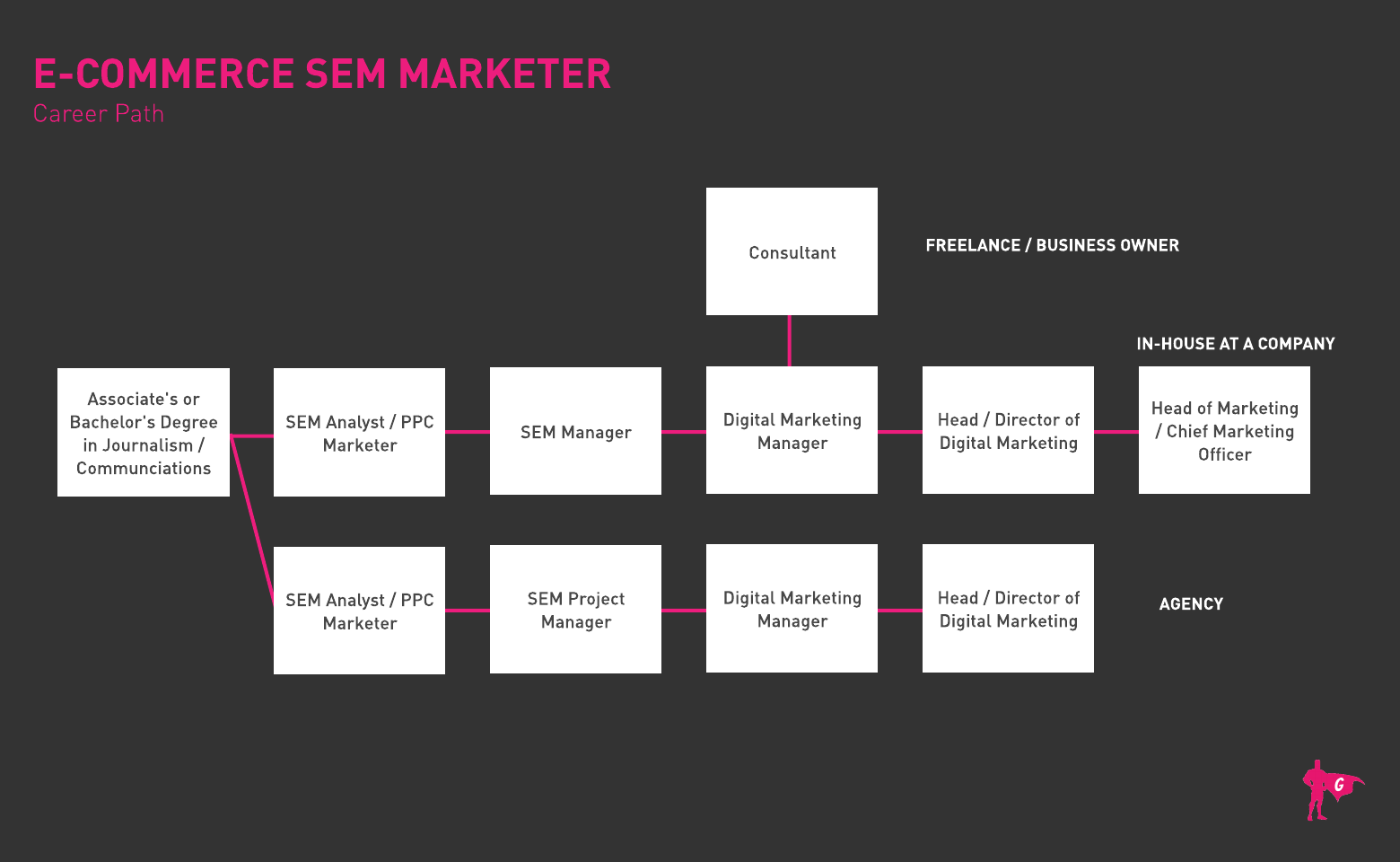Spotlights
E-commerce Paid Search Manager, E-commerce Search Engine Marketing Manager, E-commerce SEM Specialist, E-commerce Digital Advertising Manager, E-commerce PPC Manager (Pay-Per-Click), E-commerce Online Advertising Manager, E-commerce Performance Marketing Manager, E-commerce Search Marketing Manager, E-commerce Campaign Manager (SEM), E-commerce Digital Acquisition Manager, E-Business Specialist, E-Commerce Specialist
E-commerce has exploded in recent times, with 2021 on track to be a record year raking in $4.2 trillion in sales worldwide. While consumers may never entirely give up on malls and retail stores, the shift away from those traditional shopping experiences will only continue. That said, the world of e-commerce is extremely competitive, and it is hard to get noticed or stay relevant in today’s ever-evolving online marketplace. That is why businesses require savvy Search Engine Marketing (SEM) Managers!
SEM Managers know how to get e-commerce sites — and their applicable products or services — discovered by potential customers through Search Engine Optimization and paid Internet marketing techniques. They have a deep understanding of how online search engines like Google operate, as well as how end users (consumers) use those search engines to find things. Their work boosts website traffic by incorporating content and keywords that are SEO-friendly. That way, when someone types in a certain word or phrase into a search bar, the returned results include the SEM Manager’s employer! This, in turn, leads to more visibility and increased sales for the applicable business.
- Helping businesses get discovered online so they can grow and profit
- Contributing to the national (or global) economy
- Enabling consumers to easily find products or services they want to buy
- Learning more about the “behind-the-scenes” of the e-commerce world
Working Schedule
- E-commerce SEM Managers keep very busy because employers rely heavily on their skills. Expect full-time work with possible overtime during holidays or major shopping events.
Typical Duties
- Work with business leadership, developers, and marketing teams to review current and upcoming products or services
- Devise a comprehensive SEM/SEO strategy, including content calendars, social media and email campaigns, and link building activities
- Determine suitable keywords to enable organic search optimization
- Decide upon applicable SEO Key Performance Indicators
- Review analytics on click-through rates, bounce rates, and redirects
- Continually analyze data to assess if Return on Investment can be improved
- Optimize all online content to ensure search engines can readily find and rank it
- Track site performance and take action to address deficiencies
- Assess if site traffic volume corresponds with sales figures
- Use pay-per-click (PPC) to enhance site exposure
Additional Responsibilities
- Create customer avatars (i.e. buyer personas)
- Share findings via written reports, including benchmarks and lessons learned
- Keep up-to-date with emerging technologies, digital marketing trends, and changes in consumer behavior
- Suggest engaging media mixtures to optimize user engagement (such as adding videos or animation)
Soft Skills
- Analytical
- Attention-to-detail
- Business focused
- Collaboration and teamwork
- Critical thinking
- Curiosity
- Flexibility
- Investigative
- Marketing
- Organized
- Problem-solving skills
- Skills for coordinating and instructing activities
- Sound judgment and decision-making
- Strong communication skills
- Time management skills
Technical Skills
- A/B Testing
- Attribution modeling
- Business development
- Conversion Rate Optimization
- Data analysis
- HTML / CSS
- JavaScript
- Marketing
- Paid search advertising
- Social Media Marketing
- Web analytics
- Search Engine Marketing
- Ad copywriting
- Ad design
- Audience targeting
- Content marketing
- Google Ads
- Keyword targeting
- Website design
- Search Engine Optimization
- Content creation
- Link building
- On-page SEO
- Technical SEO
- Ad agencies
- Colleges and universities
- E-commerce businesses
- Governmental organizations
- Public relations
- Self-employed (freelance)
- Traditional companies with online sales
- Wholesale trade
Building an e-commerce website doesn’t mean shoppers will come. Customers have to know the site exists and be interested in what it has to offer.
Organizations rely on their E-commerce SEM Managers to ensure consumers are able to find their website, products, services, or content. They are integral members of the marketing team and especially critical in the modern era, where an invisible war rages for the attention of Internet users.
When it comes to marketing, e-commerce companies must find creative ways to break through the constant noise and clutter. They must grab a consumer’s interest long enough to entice them to click an ad or link. To find potential shoppers, they have to pepper links across a range of sources, like casting fishing lines but in an ocean already filled with boats.
E-commerce SEM Managers ensure the sites they’re responsible for are constantly up-to-date and optimized so that Google et al. can bring shoppers directly to them. All this technical work requires enormous effort and persistence. After all, other e-commerce businesses are engaged in the same behavior, and it only takes a second for potential customers to lose interest and look elsewhere.
E-commerce SEM Managers work in a field that is constantly changing yet relies on many stable principles. To be effective, they must determine how to leverage evolving digital strategies and technologies to perform traditional marketing tactics. One of the many emerging trends is the rise of Amazon’s paid advertising model, which garnered the e-commerce behemoth $12.75 billion in 2020. Another hot trend is the use of Google’s new responsive search ads.
Consumers are becoming increasingly frustrated with data breaches and intrusions into their privacy, which is why cookies may soon become an endangered species. Meanwhile, Conversion Rate Optimization is taking a front seat as companies scramble to make the most of ad budgets. A final trend in SEM is the shift to a more customer-oriented approach, which includes taking customers’ “lifetime values” into consideration.
E-commerce SEM Managers may be analytical by nature, but they understand human psychology, too. They’re usually very organized and may have been in charge of younger siblings or managing activities at school. Growing up, they may have enjoyed puzzles, reading mystery stories, or watching shows that involved searching for clues.
It goes without saying that most are adept with technology, so they could have been exposed early on to computers and devices. At some point, they took an interest in the “behind-the-scenes” workings of how search engines and websites function in terms of their interaction with human users!
- SEM Managers should ideally hold a bachelor’s degree, majoring in business, marketing, computer science, or e-commerce
- Programs should be broad enough to cover subjects such as consumer behavior, sales, visual arts, advertising, and other interdisciplinary topics
- SEM-related certifications are a good way to stand out. A few to consider are:
- Bing Ads Certification
- Google AdWords Certification
- Google Analytics Certification
- Google Digital Garage
- HubSpot Academy SEO Training
- Moz SEO Essentials Certificate
- Yoast Academy SEO
- Many e-commerce and traditional companies offer SEM Manager internships providing practical paid experience
- Newly onboarded E-commerce SEM Managers will complete ample On-the-Job Training to learn about their organization and its offerings
- Go-getters may want to complete specialized e-commerce graduate programs while working
- Unlike some career fields, there is no required major that E-commerce SEM Managers have to complete
- Look for colleges with suitable majors, minors, or specializations such as business, marketing, computer science, or e-commerce
- If attending in-person, check out the program’s computer lab and current research
- Read faculty bios to find teachers who have extensive credentials and proven successful experience in the field
- Ensure your school and program are both accredited
- Search the Association to Advance Collegiate Schools of Business for programs accredited by that organization
- Scan the web for authentic reviews from alumni and take note of any pros and cons
- Review the school or program’s statistics regarding acceptance rates, graduation rates, and post-graduation job placement. Often, schools serve as pipelines for local area employers
- Try to find a program with active student organizations involved in e-commerce studies
- Sign up for technical electives in high school that’ll come in handy later down the line
- Computer clubs are a smart way to build tech skills and learn from peers
- Get involved with extracurricular or volunteer activities that develop soft skills such as teamwork, decision-making, and conflict resolution
- Seek out SEM Manager internships with e-commerce businesses
- Knock out online certification programs over the summer to grow competencies
- Join student and professional organizations, read articles, and watch tutorial videos to learn all you can about SEM best practices and new developments
- Gain hands-on experience by building Shopify or WordPress websites and experimenting with social media and Google ads

- To get hired for your first E-commerce SEM Manager job, you should possess a solid mix of suitable education and related work experience
- If your degree isn’t in one of the above-listed majors, bolster it with SEM/SEO certifications
- If possible, try to complete an internship first or be able to show an SEM-related portfolio featuring hard statistics about your accomplishments
- Put your SEM skills to work by advertising yourself online, with a professional website and strong LinkedIn presence
- Don’t be shy about telling everyone in your network that you’re looking for a job
- Ask co-workers, supervisors, and/or professors in advance if you can list them as references
- Sign up for alerts with employment portals like Indeed.com, Monster, and Glassdoor, as well as tech job-oriented sites like Mashable Jobs, Dice, Hired, The Ladders, Crunchboard, and others
- Apply your SEO talents to cram your resume with keywords and phrases so it passes through automated tracking software. Include hard figures showing the impact your previous work experience had
- If you don’t have a draft resume, it’s easy to find free templates online, such as VelvetJob’s SEM Manager Resume Sample
- Check out Best Interview Question’s Search Engine Marketing Interview Questions and Answers
- E-commerce SEM Managers need to keep their skills razor-sharp through continual education
- Consider completing an e-commerce-related master’s degree, advanced certifications, or other professional development work
- Subscribe to industry periodicals (online or hard copy), engage with local or national professional organizations, and study emerging trends and technologies
- Ensure your work provides a substantial return on investment for your employer. Make a deep impact on their bottom line
- Solve complex problems, pose innovative solutions, and always stay positive
- If you’ve risen to the top of the SEM ladder in your company, consider asking for a raise or moving to a larger company with more promotion opportunities
- If you’ve got a good business idea of your own, think about carving out a new path for yourself as an e-commerce entrepreneur!
Websites
Books
- SEM Core Concepts: Building Blocks for Institutional and Student Success, by Dr. Wayne Sigler
- SEO 2022: Learn search engine optimization with smart internet marketing strategies, by Adam Clarke
- The Psychology of a Website: Mastering Cognitive Biases, Conversion Triggers and Modern SEO to Achieve Massive Results, by Matthew Capala
- Search Engine Marketing, Inc.: Driving Search Traffic to Your Company's Website, by Mike Moran and Bill Hunt
As you can see, working as an E-commerce Search Engine Marketing Manager can be a rewarding but challenging career choice. If this job sounds interesting, but you want to explore other options, a few alternatives include:
- Advertising Sales Agents
- E-Commerce Business Analyst
- E-Commerce Project Manager
- Graphic Designers
- Market Research Analysts
- Public Relations Specialists
- Sales Managers
Newsfeed

Featured Jobs

Online Courses and Tools

Annual Salary Expectations
New workers start around $107K. Median pay is $157K per year. Highly experienced workers can earn around $208K.






